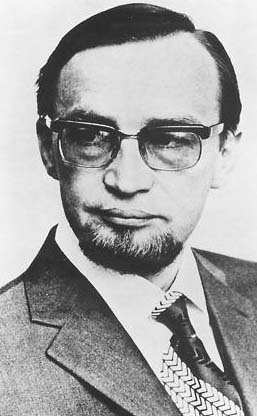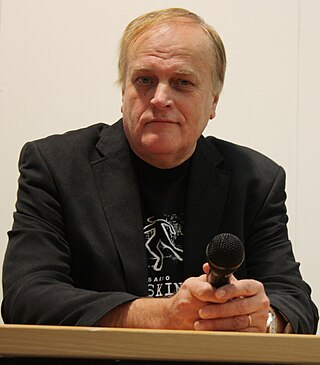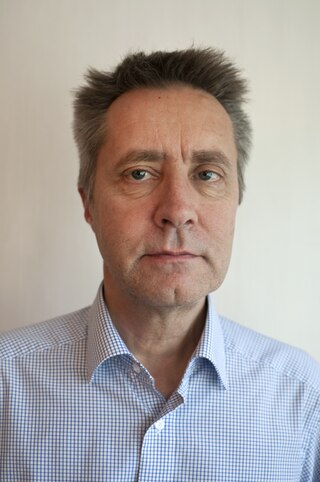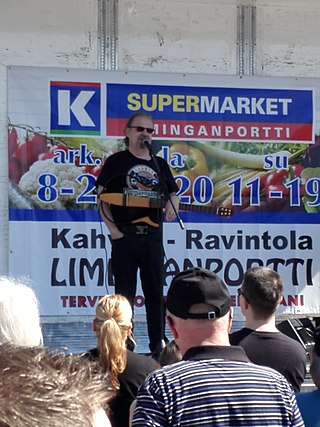
Paavo Juhani Haavikko was a Finnish poet, playwright, essayist and publisher, considered one of the country's most outstanding writers. He published more than 70 works, and his poems have been translated to 12 languages.
Helsinki slang or stadin slangi is a local dialect and a sociolect of the Finnish language mainly used in the capital city of Helsinki. It is characterized by its abundance of foreign loan words not found in the other Finnish dialects.

Mauno Jokipii was a Finnish professor at the University of Jyväskylä in history specializing in World War II. He was a thorough investigator and a prolific author. Among his works were studies of the local history of Jyväskylä and the university and historical province of Satakunta.

Jani Petteri Toivola is a Finnish actor, dancer, author and an ex-politician. He studied in HB Acting Studio, New York City in 1999–2002. He has performed in several dance works, television series and plays. Toivola is also openly gay. His father is Kenyan and mother Finnish.

Uuno Kailas, born Frans Uno Salonen was a Finnish poet, writer, and translator. Together with Kaarlo Sarkia, Kailas was the most prominent Finnish poet of the 1930s.

Seppo Sakari Jokinen is a Finnish writer of crime fiction.

Jaakko Hämeen-Anttila is a Finnish academic researcher, serving as a professor of the Arabic language and Islamic studies at the University of Edinburgh. Before that he was a professor at the University of Helsinki.

Martti Henrikki Haavio was a Finnish poet, folklorist and mythologist, writing poetry under the pen name P. Mustapää. He was born on 22 January 1899 in Temmes, and died 4 February 1973 in Helsinki. He was also a professor of folklore and an influential researcher of Finnish mythology. In 1960, Haavio married Aale Tynni, after his first wife Elsa Enäjärvi-Haavio died in 1951 of cancer. His daughter, Elina Haavio-Mannila, is a social scientist. During Haavio's early career, he was a member of the Tulenkantajat literature club.
Tähtifantasia Award is an annual prize by Helsingin science fiction seura ry for the best foreign fantasy book released in Finland.

Hannu Veikko Luntiala is the former Director General of the Population Register Centre in Finland and an author for Tammi and Aviador Kustannus, both Finnish publishing companies.

Jorma Olavi "Jope" Ruonansuu was a Finnish actor, impressionist, musician and comedian. He was born in Kemi. He won the Best performer Venla award in 2010.

Juha Sihvola was a Finnish philosopher and historian. He was a university professor of general history from 2000, and part of The Academy of Finland's Centre of Excellence program upon Philosophical Psychology, Morality and Politics, serving as the Deputy Director of the Centre of Excellence from 2008. In the years 2004–2009, he was the Director of Helsinki Collegium for Advanced Studies.

Tuomas Kyrö is a Finnish author and cartoonist. He has written novels, columns, causeries and plays and drawn comics and cartoons.

Seppo Erkki Sakari Heikinheimo was a Finnish musicologist, music journalist, writer and translator.
Kirsti Katariina Simonsuuri was a Finnish professor, writer, poet, and researcher of ancient literature. Her honors included the J. H. Erkko Award for Best First Book (1980) and the Wolfson Fellowship Award from the British Academy (1981).

Anna Taina Aleksandra Kortelainen is a Finnish scholar, art historian and non-fiction writer.

Pekka Heikki Tapani Gronow is a Finnish ethnomusicologist and historian of the recording industry. He studied at Wesleyan University with David P. McAllester and Robert E. Brown and at the University of Helsinki and received his PhD from the University of Tampere. He was the head of the record library at Yleisradio 1989–2006 and an archiving specialist 2007–2008. Gronow became known in the 1960s for his radio programs on jazz and blues. In 1966 he founded with M. A. Numminen Eteenpäin, a record company which issued Numminen's works and other underground artists.
Thoralf Kyrre was a Danish engineer who was involved in the Pro-German resistance movement in Finland from 1944 to 1945.

Antero "Antti" Rokka is a fictional character in Väinö Linna's 1954 war novel The Unknown Soldier. Antero Rokka is a well-known figure in the story, and he has taken on an almost archetypal role in Finnish culture. According to Väinö Linna's own testimony, Rokka's character is based on Linna's comrade-in-arms, Viljam Pylkäs. It is also said that Linna borrowed the character's name from a real-life Ingrian soldier, Antti Rokka, whom Linna would have gotten to know after the war, and that the Rokka in the book would also have the character traits of the real Rokka.
This page is based on this
Wikipedia article Text is available under the
CC BY-SA 4.0 license; additional terms may apply.
Images, videos and audio are available under their respective licenses.















